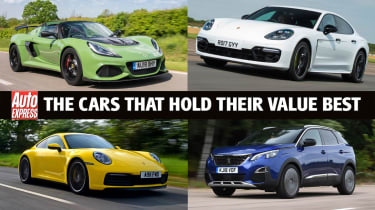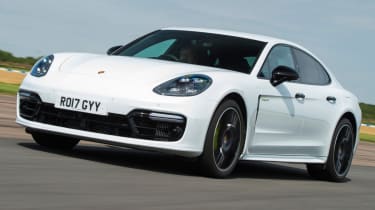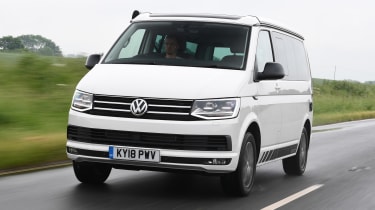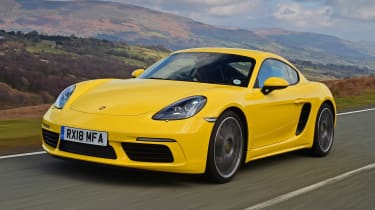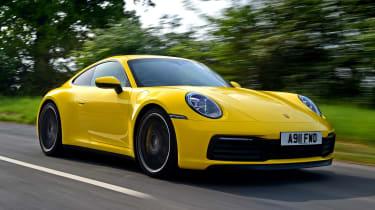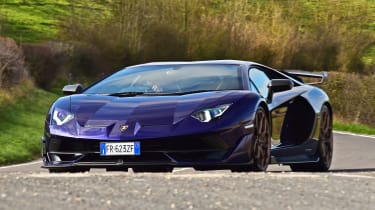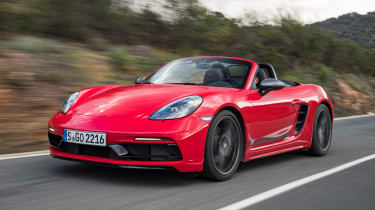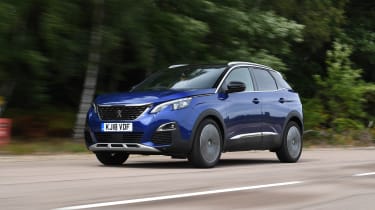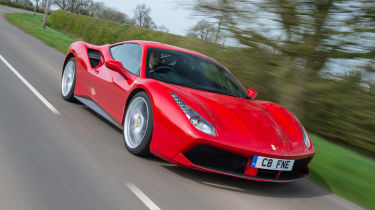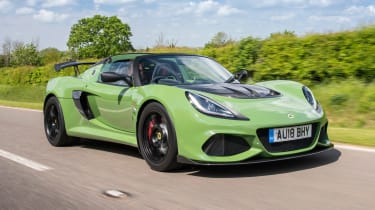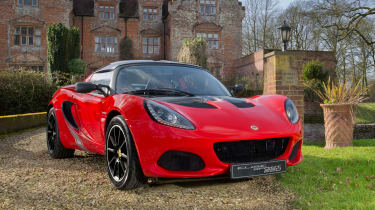Car depreciation is a fact of life with car ownership. But these are the cars that lose the least over time
When you buy a new car, you don't need a calculator to know that depreciation will set in as soon as you drive it off a dealer's forecourt. In fact, if you're buying a car on finance, then depreciation is an important factor, because the amount of money the car is worth at the end of the finance agreement determines how much you pay per month.
In simple terms, depreciation is the amount of money that a car loses over its lifetime. Place new car depreciation in a graph, and the line will start at a high point and slowly fall over time. What you want is for the line to stay as high as possible for as long as possible, so that the amount of money you lose once you do come to sell is low.
• The fastest depreciating cars
Unless you're buying a desirable classic or a limited-run performance car from an established manufacturer, then the car you buy will suffer from depreciation. It's just a fact of life, as a car that has been used by a previous owner isn't as attractive as a brand-new one. However, there are cars out there that limit your losses, and we've listed the best performers below using tha latest data from CAP HPI.
There are companies that work out a car's depreciation using a number of factors, and they will usually base this around a car's value after three years. This irons out any initial spikes in desirability as a new car comes to market, and gives a good indication of how much a car will be worth over the lifetime of a finance deal.
A car's depreciation is worked out as a percentage of its new price, while car valuation firms have reams of data that allow them to set a depreciation percentage for individual models. This data is shared with manufacturers to help them determine how much buyers will pay on a monthly basis when taking out finance on a brand-new car.
The main factor that determines a car's depreciation rate is its demand. If a car is in high demand, then that will help keep used values high, as buyers are willing to pay extra to get behind the wheel of a popular model. Take a look at all the SUVs and 4x4s for sale in the UK, and you'll see how depreciation works.
Car depreciation: what to look for
Compare an SUV with a hatchback or a saloon from the same manufacturer on a like-for-like basis, and you'll see that the SUV usually has retained a higher percentage of its original value. That's because buyers are attracted by the rugged looks and tall driving position that an SUV or crossover offers.
It's not just SUVs that are the best cars for avoiding depreciation, you can also cut your losses by choosing a desirable sports car, although the market can be a little more fickle with these machines. If you're flush with cash, then a high-end sports car or supercar can also be considered, although if you're looking to buy one of these, then depreciation is unlikely to be a deciding factor when parting with your cash.
The UK’s top 10 slowest depreciating cars on sale
For our list of the best cars for depreciation for sale in the UK, we've given an average of the entire model range after three years and 60,000 miles. So while these scores are already good, they could be even better if you pick the slowest depreciating model in the line-up.
- Porsche Panamera 63.4%
- Volkswagen California 61.0%
- Porsche 718 Cayman 58.4%
- Porsche 911 (991) 57.3%
- Lamborghini Aventador 57.2%
- Porsche 718 Boxster 55.3%
- Peugeot 3008 55.2%
- Ferrari 488 GTB 54.8%
- Lotus Exige 54.8%
- Lotus Elise 54.4%
Scroll down for more details on the 10 slowest depreciating cars in the UK and the cars that don't quite make the top 10…
1. Porsche Panamera 63.4%
Once considered the ugly duckling of the Porsche range, the Panamera can now lay claim to being the slowest car in the line-up when it comes to depreciation. A score of 63.4 per cent on an average list price of around £93,254 means a loss of £34,642 after three years and 60,000 miles.
What's even more impressive is that this score is for an executive model in a class that doesn't normally excel for depreciation. But clearly the Panamera's combination of rapid performance, sharp handling, practicality and the attractive low running costs of the plug-in hybrid models clearly puts it a step ahead of its rivals.
2. Volkswagen California 61.0%
One area of the new car market that consistently performs well is the camper van sector, and the VW California is the best performer of all. These van-based models are in strong demand because of their versatility – they don't feel particularly bulky or heavy to drive thanks to their van-based roots, while the ability to pack all your kit and go away for the weekend keeps them in demand.
The California is based on the VW T6 Transporter van, so it comes with modern engines and a car-like driving experience, which further adds to its appeal. The California is expensive, though, with an average selling price of £55,174, but at least you'll hold on to 61 per cent of its value, losing only £21,514 after three years.
3. Porsche 718 Cayman 58.4%
It's the least expensive model in the Porsche line-up, but the Cayman is a rock-solid purchase if you do decide to take the plunge. It retains 58.4 per cent of its new value, based on an average range price of £48,375, so you'll lose £20,163 after three years. Compared to some cars in our rundown, that's not a bad figure to be dealing with.
What you get for your money is one of the best-handling sports cars in any part of the market. With crisp steering, an agile chassis and lots of grip, it really inspires confidence. Not everybody is a fan of the four-cylinder engine layout, but it still delivers performance with even greater efficiency than ever.
4. Porsche 911 (991) 57.3%
The current 992-generation Porsche 911 is too new to have residuals mapped out for it, and they're going to be artificially high while new model syndrome still takes hold. But if you need proof that the 911 is just as desirable now as it was when it first arrived in 2015, then a retained value of 57.3 per cent is not to be sniffed at.
Prices have crept up over the years to an average of £92,151, and you'll lose £39,346 on that after three years. That's a pretty hefty wedge, although buyers lucky enough to be in a position to buy a GT2 RS or GT3 variant could easily break even on their purchase, such is the strong demand for these exclusive models.
5. Lamborghini Aventador 57.2%
There's nothing quite like a V12-powered Lamborghini. Everything about the Aventador is larger than life, from the dramatic styling to the phenomenal 200mph performance and even the astronomical running costs.
If you're in the market for an Aventador, then depreciation is unlikely to be much of a concern, which is a good thing, because while a retained value of 57.2 per cent is strong, you'll still lose £122,168 from the original £284,968 list price – or to put it another way, an Aston Martin Vantage-worth of value lost after three years.
6. Porsche 718 Boxster 55.3%
With the Boxster in sixth, that means the VW Group has a lockout of the top spots in our slowest depreciators list. Like its Cayman sister model, the Boxster gained four-cylinder power to boost efficiency but maintain performance. And while the purists decried the loss of the flat-six, it seems that buyers are still keen.
A loss of 55.3 per cent on an average range price of £50,236 means buyers will lose £22,511 over three years, which is around £2,400 more than you'll lose on a Cayman. But for some buyers that's a sacrifice worth making for the thrill of wind-in-the-hair motoring that the Boxster offers to go with its fantastic handling.
7. Peugeot 3008 55.2%
Considering the company that the Peugeot 3008 is keeping in this list, it just goes to show that Peugeot is doing something right with its compact SUV. On average it's predicted to retain 55.2 per cent of an average range price of £24,483. And thanks to these lower prices, a loss of around £11,000 is one of the most palatable in this list.
Take the plunge, and buyers get a roomy five-seat SUV with an interior made from classy materials that offers an air of quality that many rivals struggle to match. Add in plenty of kit across the range, a comfortable ride and low running costs, and it's no wonder the 3008 is the residual champ in its class.
8. Ferrari 488 GTB 54.8%
Back in the late 1980s, Ferraris were traded by supercar speculators for huge profits. Thanks to the tight controls Ferrari now puts on buyers of its most exclusive models, that's a rare occurrence these days, while the standard models suffer from depreciation just like other new cars.
Case in point is the 488 GTB. The mid-engine V8 model is about as mainstream a Ferrari as you can buy, and depreciation of 54.8 per cent means it'll shed £88,363 from a list price of £195,363 after three years and 60,000 miles. However, unlike a lot of models, the depreciation curve of a Ferrari will level out a lot sooner, while certain models could even climb back up the depreciation curve if you hold on to it for long enough.
9. Lotus Exige 54.8%
Here's proof that slow depreciation isn't just the domain of brand-new models. The Exige is a mid-engined sports car that has been for sale since 2012, but thanks to its limited production numbers, it still commands a premium thanks to its exclusivity.
The V6-powered coupe and roadster range retains 54.8 per cent of its value after three years, which means a loss of £26,070 on an average ange price of £57,620. And like a Ferrari, there's a good possibility that if you buy the right car in the right spec and hold on to it for a few more years, then you could even recoup that initial purchase price.
10. Lotus Elise 54.4%
Even older than the Exige is the car on which it's based. The current Lotus Elise has been for sale for almost a decade, and while the basic formula has remained unchanged, its low sales volumes mean it has excellent residuals of 54.4 per cent.
An average price of £43,770 will see £19,970 lost over three years, which isn't much when compared to some of the supercars in this list. What's more, the Elise will deliver a fun drive every time you get behind the wheel, giving you less reason to worry about how much this little Lotus is costing you in the long run.
Best of the rest
Look beyond the top 10, and there's an eclectic mix of machinery that is both desirable and wallet-friendly. At 11 is the plush people mover sister model to the VW California, the Caravelle, which is narrowly ahead of the ever-popular Nissan GT-R supercar. The Mercedes GLC leads the way for premium SUVs, while the Lamborghini Huracan follows in the Aventador's wheel tracks with figures that aren't quite as steep, but still pretty hefty.
The Mercedes V-Class is a close rival for the Caravelle in terms of space, luxury and depreciation, and the Lexus IS proves to be the depreciation champ in the compact executive saloon class. Surprisingly, the Maserati Levante places ahead of rivals such as the Porsche Cayenne and Range Rover Sport, while the Kia Niro proves that hi-tech hybrid drive is no longer the boat anchor to depreciation that it once was.
Finally, the Jaguar F-Pace is still a popular model in the class that holds on to its value well, while the Subaru WRX STi is a surprising entry in our top 20 – likely to have been helped by the fact it's the end of the line for turbocharged, four-wheel drive Subaru sports cars in the UK.
11. Volkswagen Caravelle 54.0% (Average new price: £43,789, Average depreciation: £20,159)12. Nissan GT-R 53.9% (Average new price: £97,870, Average depreciation: £45,170)13. Mercedes GLC-Class 53.9% (Average new price: £50,113, Average depreciation: £23,097)14. Lamborghini Huracan 53.1% (Average new price: £168,102, Average depreciation: £79,002)15. Mercedes V-Class 52.9% (Average new price: £51,535, Average depreciation: £24,268)16. Lexus IS 52.7% (Average new price: £36,810, Average depreciation: £17,410)17. Maserati Levante 52.4% (Average new price: £56,500, Average depreciation: £26,900)18. Kia Niro 51.7% (Average new price: £23,970, Average depreciation: £11,595)19. Jaguar F-Pace 51.3% (Average new price: £43,834, Average depreciation: £21,421)20. Subaru WRX STi 50.6% (Average new price: £30,240, Average depreciation: £14,940)
Are you surprised by any of the cars featured on this list? Let us know in the comments below…
Source: Read Full Article


